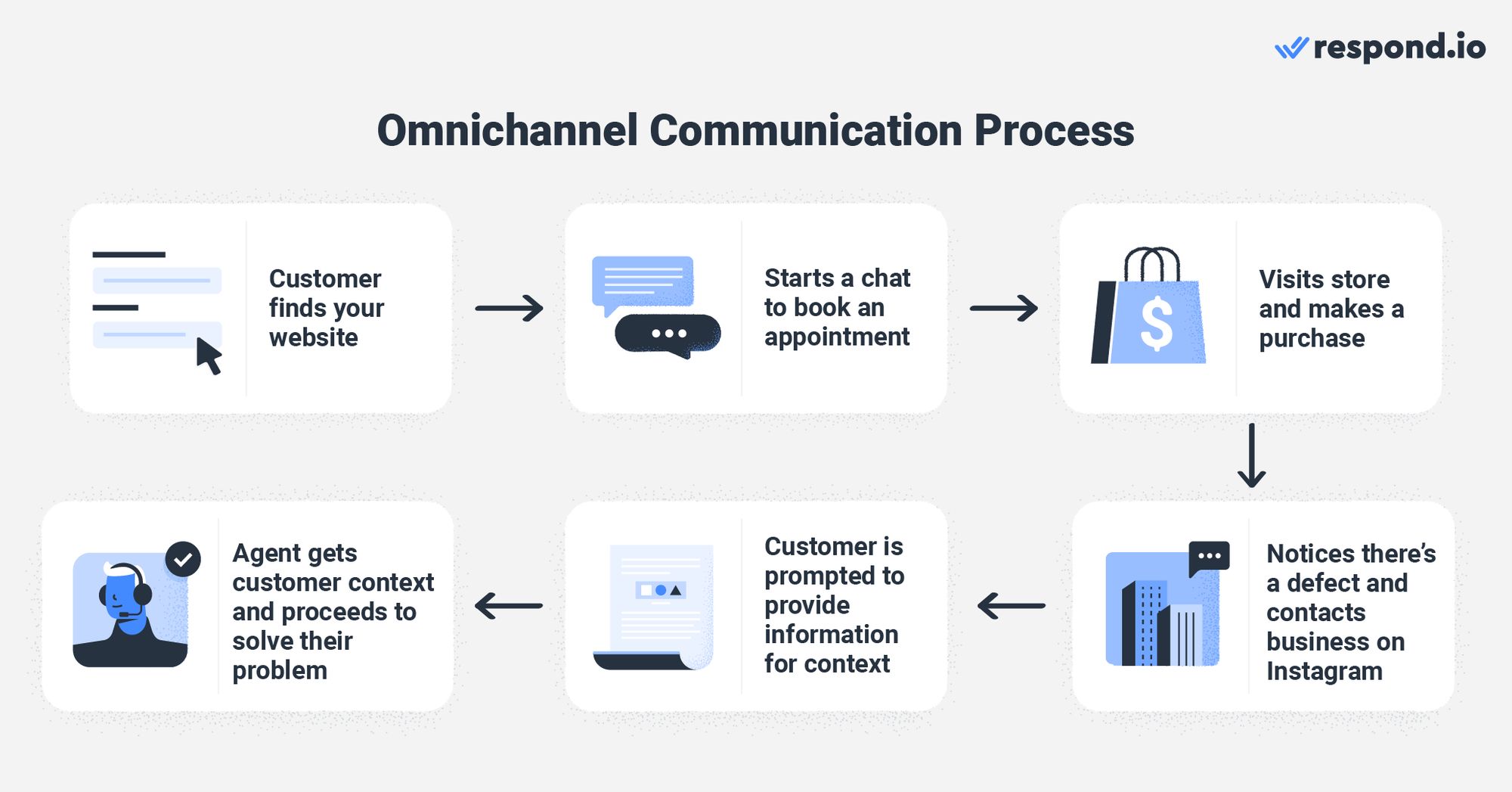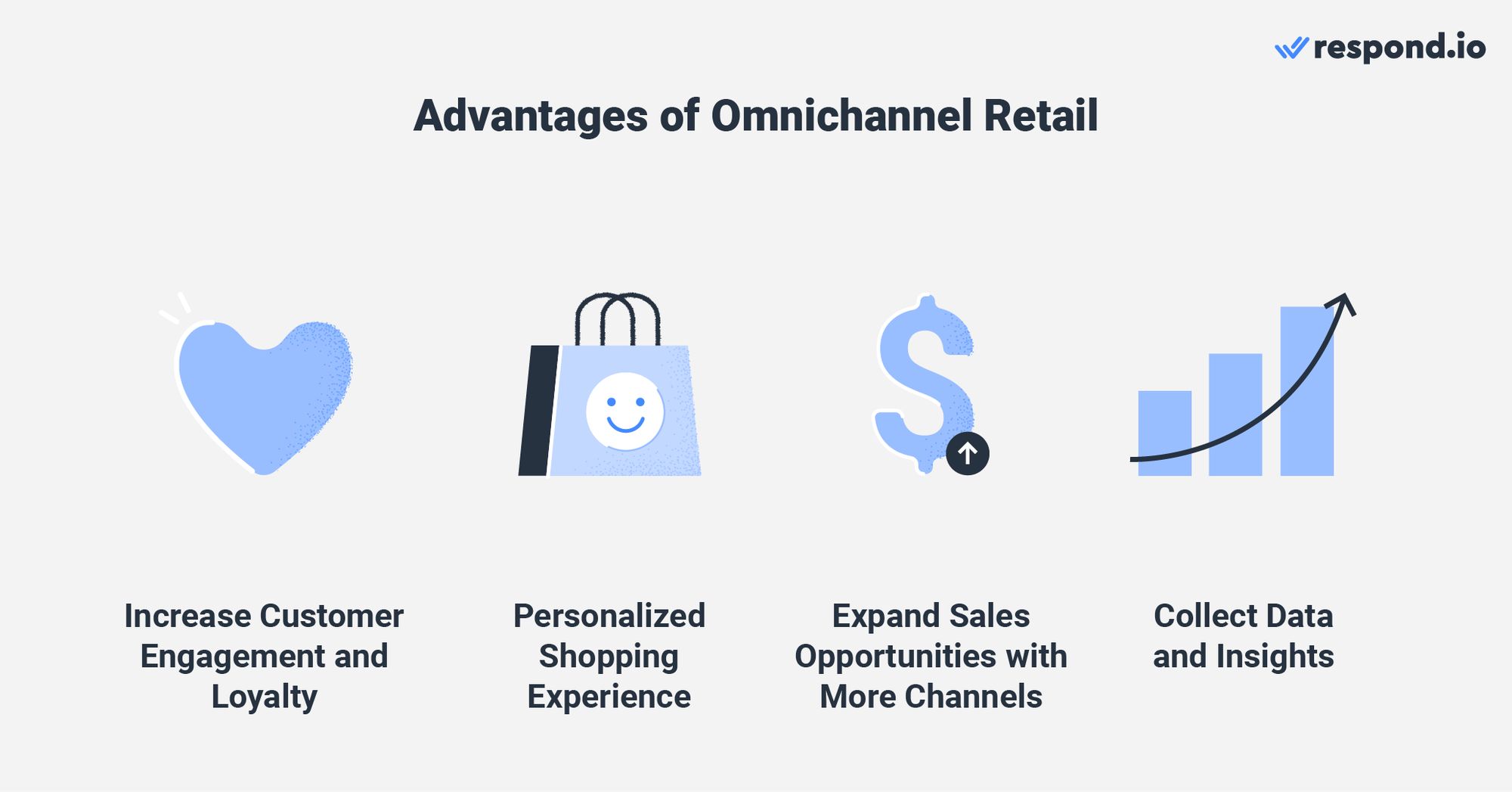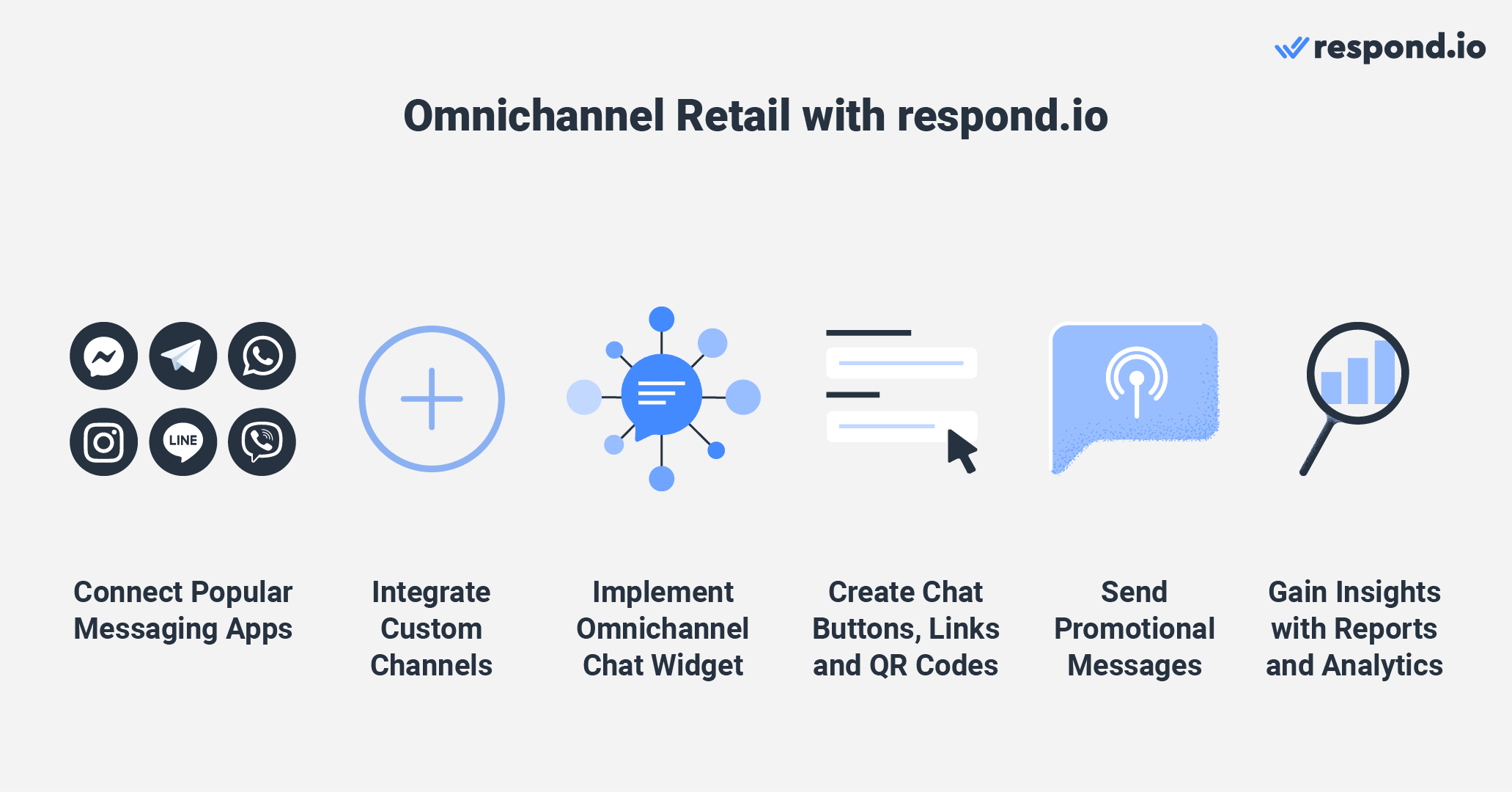
Are you interested in incorporating omnichannel retail into your business strategy, but not quite sure where to start? Look no further! This blog post will guide you through the basics of omnichannel retail and how it differs from single-channel and multichannel approaches.
We'll also explore the numerous advantages of adopting an omnichannel approach. Additionally, we'll examine three real-world examples of businesses that have successfully leveraged omnichannel retail to their advantage. Lastly, we'll explain how businesses can optimize their omnichannel retail strategy with respond.io.
What is Omnichannel Retail?
Omnichannel retail is a strategy that offers a seamless customer experience across all physical and digital retail. Customers can contact a retailer through a physical store, a website, a mobile app, social media or over instant messaging.
The goal of omnichannel retail is to create a convenient, cohesive shopping experience for customers, regardless of how they choose to engage with a retailer. Adopting this approach can enhance the customer experience, drive sales and foster customer loyalty.
For example, customers can have a consultation over messaging apps like Facebook Messenger, WhatsApp, Instagram or WeChat. They can then complete a transaction in-store or through click-and-collect.

Customers can shop on their terms online or in-store, creating a seamless shopping experience across multiple channels.
To showcase the key characteristics of omnichannel retail, we'll compare it to single-channel and multichannel strategies next.
The Differences Between Single-Channel, Multichannel and Omnichannel Retail
In this section, we'll examine the different strategies that businesses can use to enhance customer engagement, including single-channel, multichannel and omnichannel approaches, to help you determine the best fit for your business.
Single-channel retail involves selling products through only one channel, such as a physical store or a website. This approach can limit the retailer’s reach and may not allow customers to interact through different channels.
Single-Channel vs. Multichannel vs. Omnichannel Retail
Retail Strategy | Advantages | Disadvantages |
Single-Channel | Simple and easy to manage | Limited reach and customer engagement |
Multichannel | Offers customers more options for engagement | Inconsistent customer experience due to disconnected channels |
Omnichannel | Wide audience reach. Offers a personalized and consistent customer experience | Requires tech investment to integrate all channels and customer data |
In contrast, multichannel retail engages customers through various channels. However, these channels are not integrated, leading to a fragmented customer experience.
A retailer with disconnected channels can create a disjointed experience. For example, a customer makes an appointment over WhatsApp to pick up an item in-store but discovers at the store that the appointment doesn’t exist.
Omnichannel retail is the most advanced approach, integrating all channels to offer a seamless and unified customer experience. This requires retailers to invest in technology and processes to integrate data and deliver personalized customer experiences.
However, it’s a worthwhile effort. Let's delve into the benefits of adopting an omnichannel strategy for retailers.
Benefits of Omnichannel Retail
Adopting an omnichannel retail approach provides retailers with numerous benefits. Reaching customers on their preferred channels can boost customer engagement and loyalty, leading to repeat business and higher sales.
Businesses can also offer a personalized shopping experience for customers, tailoring product recommendations and promotions based on their preferences and behavior.

Omnichannel retail offers customers more opportunities to engage and purchase both online and offline. This not only provides businesses with more sales channels but also allows them to reach a wider audience.
This approach also enables businesses to collect data from multiple channels, gaining insights into customer behavior and preferences, enabling data-driven decisions to optimize product offerings and improve the customer experience.
Next, we’ll examine three businesses that successfully implemented omnichannel strategies to enhance the customer experience, boost sales and stay competitive in today's market.
Turn customer conversations into business growth with respond.io. ✨
Manage calls, chats and emails in one place!
Omnichannel Retail Examples: How 3 Businesses are Winning at Omnichannel Retail
Here are some real-life examples of businesses leveraging omnichannel retail to enhance customer engagement, drive sales and offer better support to their customers.
Bella Piel
Bella Piel created an omnichannel experience for their customers with respond.io. Centralizing all messaging channels allowed the skincare company easily train agents in offering personalized consultations remotely over instant messaging, recreating the in-store experience.

It also consolidated regional social media channels to create a single brand voice, resulting in a cohesive customer experience for all channels and regions. This successful omnichannel communication strategy earned the company a regional award for outstanding customer experience.
Sephora
Sephora's omnichannel retail strategy offers personalized shopping experiences through online and in-store options, complemented by its Beauty Insider Rewards program.
The program helps customers to access their digital shopping cart known as Beauty Bag on their phone or desktop, providing the convenience of shopping, viewing favorite items, checking purchase history and monitoring reward points.
In addition, in-store customers can scan physical products to view other available options online and watch makeup tutorial videos, creating a seamless shopping experience across all channels.
Crate & Barrel
Crate & Barrel recognized that many consumers switch between devices when contemplating a purchase. To offer a seamless shopping experience on all devices, the company implemented an omnichannel approach.
The Crate & Barrel app saves a consumer's shopping cart and browsing data when they are logged in. This enables customers to access this information across multiple devices so they can resume where they left off shopping, regardless of the device used.
Crate & Barrel's improved mobile and web stores resulted in a 10% revenue increase. In addition, the company continued to innovate and released its 3D Room Designer feature, allowing consumers to virtually place items into their homes before making a purchase.
Next, we’ll look at how using omnichannel retail via a messaging platform like respond.io can benefit your business.
Omnichannel Retail with Respond.io: 6 Quick Wins
Here, we will learn how businesses can benefit from using respond.io to optimize their communication channels and enhance customer support.

Omnichannel Retail Strategy: Centralize All Popular Channels in One Place
Respond.io supports popular messaging apps like WhatsApp, Facebook Messenger, Telegram, LINE and Viber. This makes it easy for retailers to manage all their customer inquiries in one place, regardless of the channel used.
Moreover, its Contact Merge function helps retailers to recognize returning customers on any channel to track their interactions and provide a seamless and cohesive omnichannel experience.
Beyond centralizing channels, respond.io also enables AI Agents to operate across an omnichannel retail environment. With the right setup, AI Agents can handle customer chats and calls, answer common questions, trigger workflows, add internal comments, qualify leads and even manage 24/7 voice calls through Voice AI Agents before escalating complex cases to human teams.
Omnichannel Retail: Integrate Custom Channels like In-app Chat, Chats from E-commerce Platforms and more
Respond.io's custom channels integration offers businesses the flexibility to connect any custom channel with an open API. This includes their own messaging app or an e-commerce platform’s native inbox, such as the Lazadda chat inbox.
Businesses can then manage customer conversations on every single channel from a single platform, resulting in a more efficient customer experience.
Respond.io can also integrate with CRMs and other tools like Hubspot, Salesforce, Pipedrive and more. This makes it easier to create deals or tickets, or exchange and update customer data while chatting with customers.
Omnichannel for Retail: Streamline Customer Support with an Omnichannel Chat Widget
In addition, respond.io offers an omnichannel chat widget that can display all connected channels in a single collapsible widget. It can be embedded on a retailer's website, making it easy for customers to make inquiries on their preferred channels.
Messaging apps offer a more reliable means of collecting customer contact information compared to web chat, where visitors can remain anonymous or use fake details. This enables businesses to provide personalized services and add them to contact lists for future marketing initiatives.
Omnichannel Retail Solution: Use Chat Buttons, Links and QR Codes to Drive Engagement
Respond.io facilitates cross-channel communication for customers to reach out through various touchpoints. This includes adding WhatsApp chat buttons on Facebook or Instagram to turn social media followers into WhatsApp contacts effortlessly.
Retailers can share chat links in digital spaces or place QR codes around their stores to encourage customers to message, providing a seamless shopping experience that bridges the gap between physical and digital channels.
Omnichannel Retail Strategy: Send Promotional Messages on Multiple Channels
Respond.io's Broadcast Module supports multiple channels, allowing businesses to send or schedule personalized broadcast messages.
Additionally, integrations with popular e-commerce platforms like Shopify, WooCommerce and Magento enable businesses to set up event-triggered messaging.
Common event-triggered messages include drip campaigns, abandoned cart messages, order confirmations and delivery updates. With these integrations, businesses can streamline customer communication and offer a better overall customer experience.
Omnichannel Retail Solutions: Boost Retail Sales with Reporting Insights
Respond.io's Reports Module provides valuable insights into sales conversations and agent performance. Retailers can identify knowledge gaps, optimize their messaging strategies and drive growth through this capability.
Omnichannel retail has become an essential strategy for businesses. It helps them deliver a seamless and consistent shopping experience across all channels. If you're looking to take your business to the next level, sign up for our free trial today!
Turn customer conversations into business growth with respond.io. ✨
Manage calls, chats and emails in one place!
Further Reading
Interested to learn more about how you can use an omnichannel communication platform to elevate your business? We recommend checking out the following additional readings.






































 Electronics
Electronics Fashion & Apparel
Fashion & Apparel Furniture
Furniture Jewelry and Watches
Jewelry and Watches
 Afterschool Activities
Afterschool Activities Sport & Fitness
Sport & Fitness
 Beauty Center
Beauty Center Dental Clinic
Dental Clinic Medical Clinic
Medical Clinic
 Home Cleaning & Maid Services
Home Cleaning & Maid Services Photography & Videography
Photography & Videography
 Car Dealership
Car Dealership
 Travel Agency & Tour Operator
Travel Agency & Tour Operator




